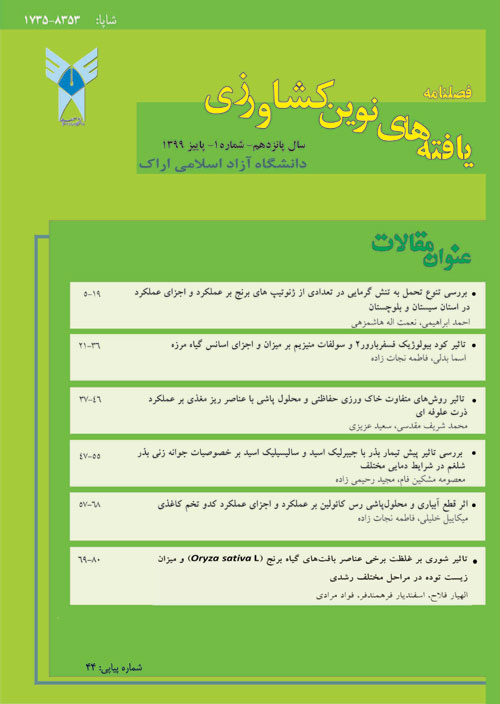The effect of salinity on concentration of some elements of Rice (Oryza Sativa L.) tissues and biomass in different growth stage
Salinity stress causes change in absorption and transformation of nutrients in rice plants. In order to determine of salinity affect in different growth stages of rice crops on the concentration of sodium, potassium, calcium and magnesium ions of roots, stems and leaves, was carried out pot experiment in the greenhouse of rice research institute of Iran(Amol) in 2014. The experiment as a split plot factorial in base of completely random design with three replicates, with two rice varieties, hybrid rice (Dialam) and PSBRC88 as main plots, and three levels of salinity (0, 6, 12 ds.m-1 ) with three growth stages (Tillering, Stem elongation, Flowering) as sub-plots factorial. Hydroponic culture was done in pots with 6 L Yoshida solution. The content of sodium, potassium, calcium and magnesium ions of roots, stems and leaves were measured that salinity treatments were done about 20 days for each stage. The results showed that the content of potassium, calcium and magnesium ions of roots, stems and leaves were decreased with increasing of salinity level at each growth stage. In check treatment, the highest of ions concentration was at flowering stage and the ions content of roots was always less than stems and leaves. The concentration amount of potassium, calcium and magnesium were higher in PSBRC88 variety than hybrid rice (Dialam). Therefore, PSBRC88 variety had higher ions uptake efficiency of sodium, potassium, calcium and magnesium in slat stress and had more biomass.
-
The effects of nanosilicon on morphological and biochemical characteristics of rice cultivars (Oryza sativa L.) at flowering stage in saline paddies
Sakineh Esmaeily Kenary, Monir Hosseinzadeh Namin *, Khadijeh Kiarostami,
Journal of Plant Research, -
Impact of different rice cropping patterns on the transitional population of Chilo suppressalis W., (Lep.: Crambidae ( overwintering’ larvae, in Mazandaran province)
Mehrdad Amooghli-Tabari *, Ali Moumeni, , Mehdi Rostami, Mohammadtaghi Karbalaie
Applied Entomology and Phytopathology,



